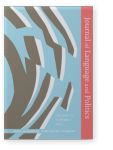Vol. 12:1 (2013) ► pp.29–58
Evidencing international threat
Examining Iraq Survey Group’s post-invasion verification of Iraq’s WMD threat
By studying the discourse utilized by the Iraq Survey Group (ISG) and its chief officers during 2003–2004, we show the methods by which U.S. government-appointed experts helped to affirm the existence of an Iraqi threat even in the absence of physical evidence for weapons of mass destruction (WMD) stockpiles or active weapons programs found in Iraq during U.S. ground search. Their data collection and interpretation work illuminates the principle that the claims and calculations of international threat can be primarily constructed by language and discourse processes rather than by direct/concrete material referents. It also points to the need for institutions and a lay audience to apply a higher evidentiary threshold to ascertain the existence of an international threat.
